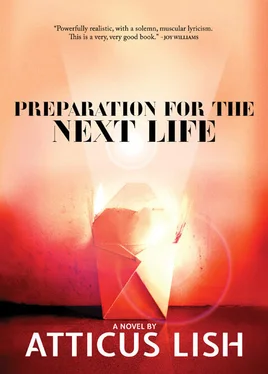Okay, she said. And what they do with me?
That’s the thing. They can do anything they want, because of your status.
I can be my life in here?
A good part of it. Look at Gitmo.
But there was more, she learned. This was just the beginning. Any deputy could take you by the elbow on a long walk through the jail to the other side. He could show you to a laundry room full of male trustees and say, Here’s your new helper. Howbout I leave her here? He would wait just long enough for your blood to run cold. Just kidding. You shit yourself? You wanna check? And he would march you back to the female wing. Along the way, he would say, Bet you feel like being nice now. He would lock you in the bathroom and come back for you later. If you fought him, he was authorized to rush you like a man, tackle you, pound your head on the floor, Taser your backside while you crawled, drag you out by the leg while you screamed under the cameras recording all of this in black and white, strap you in The Chair, put the spit bag on your head and leave you there for up to twelve hours while you begged for water. And he could count to twelve any way he wanted. You could see a social worker who would look at your blackened eyes like plums and say, Why were you fighting with staff? and write Antisocial on her form. They would add time to whatever sentence you got, whenever you finally got a sentence, so they could help themselves to more of your life. All you had to do was give someone a reason. They were going to rape you unless you carried yourself a certain way, and even then, they could nail you anytime, misplace you in the laundry room. They did it to the small half-Indian girls in the Mexican gangs. If you cried too much afterwards, you got Trazodone. Then they wheeled you upstairs strapped to a folding bed and left you in a hall.
Anyone who was here on immigration sweeps was in violation of the Patriot Act. If you were suspected of terrorism things got really interesting. There was a cell on the upper tier that no one ever left. Or had she failed to notice that?
They showed her what was going on on the top tier, in the cell that no one ever came out of. They had a project they’d been working on. It was a woman lying in a bunk. The deputies gave her to us. We take care of her. Right after 9/11 they put her in a cell with like fifteen guys. She was in Al Qaida for real. I don’t know how they could get it up because she’s so nasty. Look at her. She’s old. Zou Lei looked at the woman. She couldn’t tell if she was breathing. They told her she was Lebanese, a mom. Her husband had been flown from New Haven to Syria for interrogation. Dried feces on the walls. Her feet were black, hair tangled wild over her face, going gray, going white. They threw wet toilet paper at her. Used tampons. A black girl screamed at her. Ugh. You stink so bad! and ran out cackling.
The woman would not speak or move. The Americans had uncovered her head and she lay with her hands clutched over her face.
Zou Lei wanted to leave.
Scared? an inmate asked. I don’t blame you.
In the northwest, she used to see men lying under the saplings on the medieval street in the desert town where she grew up, the dome of the mosque visible above the mud-brick houses. The men lay directly on the stone, face-down against the curb, faces sunburned, skullcaps still on their heads, their sandals sometimes having fallen off and lying a few feet away. The street where they were lying went uphill to the mosque, and when she was a little girl, before she knew what heroin was, she thought they had been climbing the hill to the mosque and had gotten tired along the way and laid down to sleep.
God be with you, she said to the woman.
IF YOU TURNED AND looked downhill from the mosque, you saw the end of the city, the last stones of the wall, then the gravel on the ground and the red sand and the desert descending away from you. The land rushed out and away from your feet and opened out into the vast distance, to the snowcapped mountains on the horizon. There was a great desire to launch yourself out into that distance and fly out to the mountains, which were in sharp focus in the brilliant air.
Until the call to prayer sounded from the mosque in the evening, the only thing you heard was the desert wind. It was quiet in the orchards. A donkey cart wheeled by, clop-clop-clop, with a suntanned old man sitting up front holding a lash, carrying melons, peaches or his daughters in the back. In some parts of the town, you could hear the hammering of tinkers, and if you went down west of the orchards, there were stone sheds with a fire roaring up and a bare-chested boy in a white skullcap working a bellows who would look up and grin at you, his face carbon-blackened.
Her mother picked watermelon in the orchard by a ditch near a half-built section of roadway. It was so quiet you could hear the flies, the thump of a melon rolling into the cart, the creaking of the cart when the long-eared donkey shifted. The women worked in earrings and skirts and headscarves with flowers on them. At noon, they prayed on a rug. They worked slowly in the immense dry desert heat and their sweat dried immediately. They would go to the spigot by the mud wall and drink from the tin cup and you would hear them laughing with each other as they drank as a group.
The city was on a route that came out of the desert and went on to the west. Trucks came in from Aksu and went back with sheepskins. She remembered the smell of animals and dung and wood fire, everyone putting out whatever they had to sell on the roadside, the pink plastic sandals her mama bought her, her dirty feet. Playing soccer on the clay behind the bus station.
When the trucks came in, she ran out on the shoulder to see who it was. Someday it would be him, she knew — she hoped and prayed — her mother told her. God willing. Sometimes there were live sheep in a flatbed with a blue cab. Sometimes a soldier or a Mongolian, in ragged army surplus or bellbottoms, climbing down and squatting in the half-shade, eating lamb kawap, while Zou Lei hung around watching.
Have you come from far away?
A grown man ignoring her, squinting. Sometimes grunting, lifting his greased chin, at the distance. Shaking his head. Nodding. Waving the flies away or ignoring them. The sun reflecting on the mud houses on the roadside, the one thing built by man, and everywhere else the tremendous soaring vastness.
The northwest was a territory of tribal nomadic herdsmen who did not recognize the borders between nations. They traded sheep and horses and spoke each other’s languages. In the vineyards, they grew their fruit. The word for man was adam. Apple was alma. Silk, yurt, camel, and khan were pronounced the same in Uzbek and in Uighur. Tibetan women hiked up from Qinghai, carrying blankets and silver things to sell, wearing black cowboy hats and sheath knives. They would not let you touch them. Her mother’s family’s ancient dead were buried in Siberia.
The songs were the same. The girls sang them turning around, looking over their shoulders, coins around their heads.
The sun reverberating on the golden land, the snowcapped mountains — Afghanistan in the radiant air — no clouds — ram’s music — purely wondrous blue over this part of the earth. Her mother’s God above, causing the streams to flow from the snowcaps and make green the pasturelands and vineyards — the Kazak horses grazing!
In Gulja, the Russian architecture was European, with white columns, like a palace in France, and then, over the tops of the conifers, you saw the blazing dome of the mosque. Her mother’s people came down from the steppe, before they were collectivized by the Chinese, who came from the east.
The Chinese closed the border. They paved the highway and put up red banners and billboards for the good of everyone. In Altai Province, they established cotton plantations. The nomads were forced to curtail their trading. Now they were peasants, according to the Chinese, who found work for them picking cotton. Everything was being done for their own good. We are all one family. To prove that this was true, nomad girls were eligible for one hundred dollars if they divorced their husbands and married Chinese men. The new loudspeakers attached to the medieval buildings in the desert towns announced that we are very happy. Ration cards will be issued. Splittism is a serious offense.
Читать дальше












